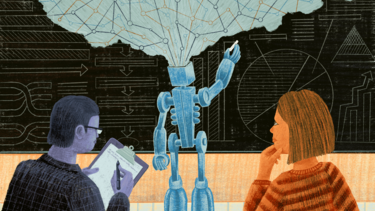Technology
How Millions of Simulated Maps Can Help Us Make Electoral Districts That Feel Fair
Part of resolving the political redistricting stalemate, writes Professor Jamie Tucker-Foltz, is creating congressional maps that align with human intuition about fairness.

Is AI a Savior or a Peril—or Both?
With applications of artificial intelligence spreading from the realm of data science to the apps at your fingertips, a day-long conference at the Yale School of Management considered how to unlock the technology’s positive potential while containing possibilities for misuse, misinformation, and labor-market mayhem.

Can Industrial Policy Help Revive Struggling Regions?
A new paper co-authored by Yale SOM’s Cameron LaPoint looks at an effort in 1980s Japan to narrow economic inequalities between geographic regions, in order to understand the potential impact of the similar U.S. CHIPS and Science Act, enacted in 2022.

Assembling an Economy in Space
A mix of public and private investments are positioning the space economy for a period of growth and innovation, says Sven Eenmaa ’98, director of investment and economic analysis at the International Space Station U.S. National Laboratory.

Can ChatGPT Accelerate Social Science Research?
Yale SOM’s Balázs Kovács and his co-authors spent years designing a computer-based method to measure “typicality.” In a new study, they found that ChatGPT could duplicate their results at a fraction of the cost.

The Israel-Hamas War Reveals the Fundamental Flaws of Social Media
Yale SOM’s Jeffrey Sonnenfeld and Steven Tian write that the viral spread of anti-Semitic and Islamophobic content over the last two months has underlined the failure of social media platforms to control misinformation and hate—and the importance of truth in the face of propaganda.

What Went Wrong at OpenAI?
Days after he was suddenly fired, CEO Sam Altman returned to OpenAI on November 21, and the board that removed him was overhauled. We asked leadership expert Jeffrey Sonnenfeld how the company’s structure and the performance of the board contributed to the chaos.

Imagining Future-Ready Infrastructure
Our aging infrastructure isn’t ready for climate change. David Gilford ’07 explains how new resilient, technology-enabled infrastructure can help us thrive in an uncertain future.

Meet the Five Schools of Thought Dominating the Conversation about AI
Yale SOM’s Jeffrey Sonnenfeld and Steven Tian and economists Paul Romer and Dirk Bergemann explain the arguments from each camp in the debate over artificial intelligence, from true believers to alarmists.

We Put Aside the Hype and Asked CEOs What They’re Actually Planning for AI
The headlines are full of grand and sometimes terrifying speculation about the potential of artificial intelligence. At Yale SOM’s CEO Summit recently, Prof. Jeffrey Sonnenfeld asked business leaders for some real talk about how their companies are using the technology.

Data from Twitter Can Predict a Crypto Coin’s Ascent
Cryptocurrencies are notoriously volatile. But listening carefully to social media chatter can help identify winning short-term investments in crypto, according to a study from Yale SOM’s Tauhid Zaman and Khizar Qureshi.
